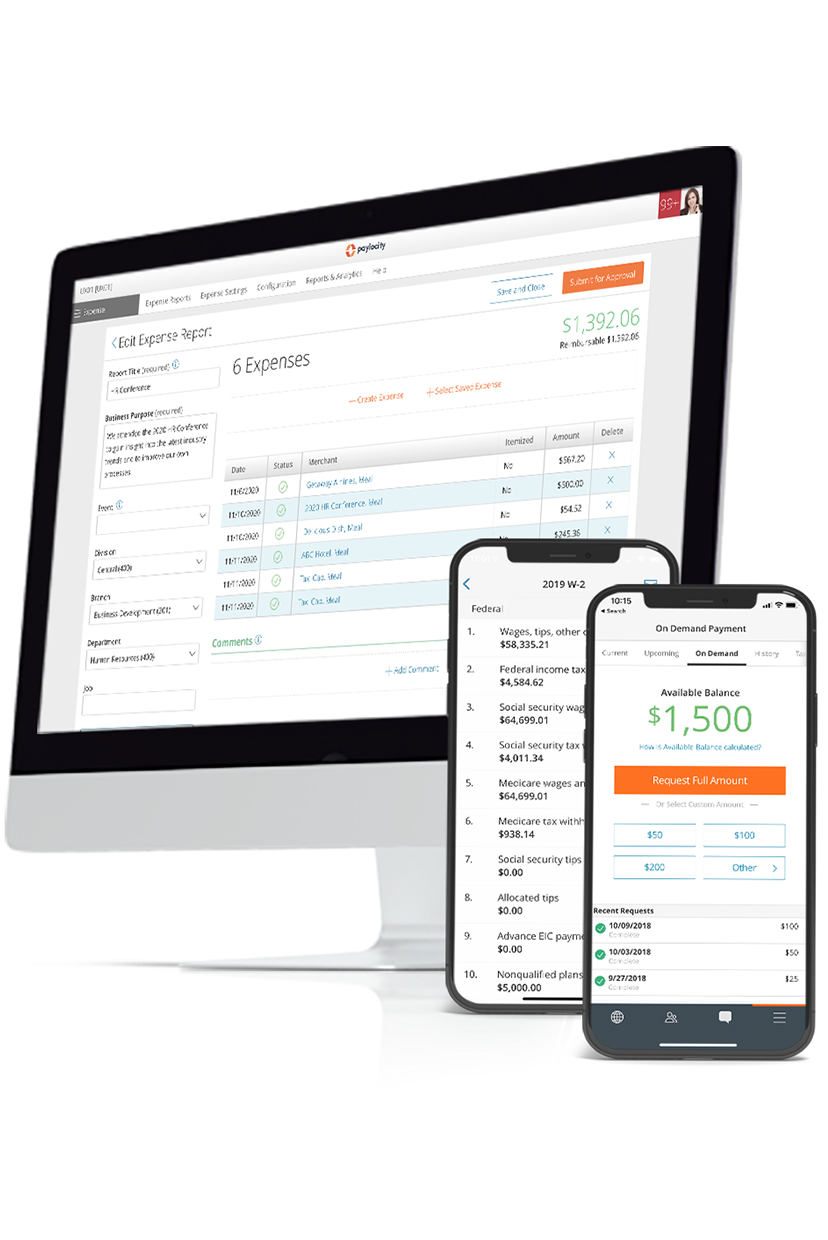resources
Compliance 101 Brief: Final Paycheck Laws
April 15, 2024
Issuing an employee’s last paycheck can be trickier than you may realize. Explore how federal and state laws address and regulate this payroll task.
Blog Post

Cleanly and efficiently wrapping up an employee’s offboarding involves several tasks, but issuing their final paycheck may be the one they value the most. This process can sound simple enough, but there are legal nuances employers should know to avoid regulatory penalties for noncompliance.
NOTE: The below information was last updated April 12, 2024. It is not intended as legal or tax advice.
What are Final Paycheck Laws?
Final paycheck laws are the regulations surrounding an employee’s final pay after their employment ends. The Fair Labor Standards Act (FLSA) addresses federal requirements, but each state can establish its own set of laws, provided they don’t contradict the FLSA.
For example, federal law doesn’t require an employer to distribute a former employee’s final pay immediately, but some state laws do.
Final Pay vs. Severance Pay
An important distinction to keep in mind is a final paycheck isn’t the same as severance pay. For one thing, employers usually aren’t required to offer an employee severance pay, but even if they do, they don’t have to include everything in a single check.
Secondly, severance pay can be negotiable based on the situation. Final paychecks aren’t as flexible, but they can contain more than just an employee’s final wages.
Key Takeaways
- Final paycheck laws govern how and when an employer issues an employee’s last paycheck.
- Final pay isn’t the same thing as severance pay but can include additional amounts aside from final wages (e.g., supplementary income and unused vacation days).
- Outside the Fair Labor Standards Act (FLSA), final paycheck laws are usually state-based, so long as they don’t conflict with FLSA requirements.
Final Paycheck Factors
When reviewing final paycheck laws by state, there are a few common factors to consider regardless of where the organization is located:
- Final Pay Contents – In addition to final wages, an employee’s last paycheck can include supplemental income. Some laws require employers to also include accrued, unused paid time off (PTO), but that can vary between states.
- Termination vs. Resignation – State laws on the final paycheck for terminated employees often require a shorter (sometimes immediate) timeline, even if that deadline requires an off-cycle payroll. Conversely, if the employee voluntarily quits or resigns, there’s often more wiggle room, such as waiting until the next regular payday.
- Unreturned Equipment – Generally, employers aren’t allowed to withhold unpaid wages just because the employee has unreturned or lost company equipment. At most, employers can sometimes deduct from a non-exempt employee’s final wages to cover such costs, but it depends on the state and details involved.
Final Paycheck Laws by State
The FLSA only requires wages to be paid on the regularly scheduled payday for the corresponding pay period. However, similar to minimum wage rates, there are different final pay laws by state with different deadlines depending on how the employment ended. States without such a law default to FLSA timelines.
| Jurisdiction | Final Paycheck for Non-Voluntary Termination | Final Paycheck for Voluntary Resignation |
| Alabama | No state law | No state law |
| Alaska | Within three working days | By the next regular payday that’s at least three days after the employee gave notice |
| Arizona | The next regular payday or within seven working days of the separation, whichever is sooner | By the next regular payday |
| Arkansas | By the next regular payday | No state law |
| California | Immediately | Either at the time of quitting (if the employee gave at least a 72 hour notice) or within 72 hours of the employee quitting (if they gave no notice or quit earlier than planned when notice was given) |
| Colorado | Immediately, unless the payroll department isn’t operational at the time of separation | By the next regular payday |
| Connecticut | By the next business day | By the next regular payday |
| Delaware | By the next regular payday or three business days after the employee’s final work day, whichever is later | By the next regular payday or three business days after the employee’s final work day, whichever is later |
| District of Columbia | No later than the next working day after the separation | By the next regular payday or within 7 days of the employee quitting, whichever is sooner |
| Florida | No state law | No state law |
| Georgia | No state law | No state law |
| Hawaii | Immediately or by the next working day if unable to do so immediately | By the next regular payday |
| Idaho | The next regular payday or within 10 working days (not including holidays or weekends) after the separation, whichever is sooner. Additional rules apply if the employee requests early pay. | The next regular payday or within 10 working days (not including holidays or weekends) after the employee gave notice, whichever is sooner. Additional rules apply if the employee requests early pay. |
| Illinois | At the time of separation or by the next regularly scheduled payday day if unable to do so immediately | At the time of separation or by the next regularly scheduled payday day if unable to do so immediately |
| Indiana | By the next regular payday | By the next regular payday |
| Iowa | By the next regular payday | By the next regular payday |
| Kansas | By the next regular payday | By the next regular payday |
| Kentucky | The next regular payday or within 14 days of the termination, whichever is later | The next regular payday or within 14 days after the employee gave notice, whichever is later |
| Louisiana | The next regular payday or within 15 days of the termination, whichever is sooner | The next regular payday or within 15 days after the employee gave notice, whichever is sooner |
| Maine | By the next regular payday | By the next regular payday |
| Maryland | By the next regular payday | By the next regular payday |
| Massachusetts | Immediately | By the next regular payday |
| Michigan | As soon as the final amount can be determined | As soon as the final amount can be determined |
| Minnesota | Immediately | By the next regular payday unless it’s less than five days from the employee’s final day. In those cases, by the following regular payday not greater than 20 days after the employee’s final day of work. |
| Mississippi | No state law | No state law |
| Missouri | Immediately | No state law |
| Montana | By the next regular payday or within 15 days after the separation, whichever is sooner | By the next regular payday or within 15 days after the separation, whichever is sooner |
| Nebraska |
By the next regular payday or within two weeks of the termination, whichever is sooner. Commissions are due by the next regular payday after the employer is paid for the goods or services that generated the commission. |
By the next regular payday or within two weeks after the separation, whichever is sooner. Commissions are due by the next regular payday after the employer is paid for the goods or services that generated the commission. |
| Nevada | Immediately | By the next regular payday or within seven days after the separation, whichever is sooner. |
| New Hampshire | Within 72 hours of the termination | By the next regular payday or within 72 hours if the employee gave notice |
| New Jersey | By the next regular payday | By the next regular payday |
| New Mexico | Within five days for all fixed wages (e.g., salary) and 10 days for all non-fixed wages (e.g., commissions, piece-work, etc.) | By the next regular payday |
| New York | By the next regular payday | By the next regular payday |
| North Carolina | By the next regular payday, except for when the wages are based on commissions, bonuses, or other supplemental income. In those cases, after the final amount can be calculated to include said bonuses, commissions, and supplemental income. | By the next regular payday |
| North Dakota | By the next regular payday | By the next regular payday |
| Ohio |
By the first day of the month (if the wages were earned in the first half of the prior month) or the 15th of the month (if the wages were earned in the second half of the prior month). For example, wages earned on April 8 must be paid by May 1, whereas wages earned on April 23 must be paid by May 15. |
By the first day of the month (if the wages were earned in the first half of the prior month) or the 15th of the month (if the wages were earned in the second half of the prior month). For example, wages earned on April 8 must be paid by May 1, whereas wages earned on April 23 must be paid by May 15. |
| Oklahoma | By the next regular payday | By the next regular payday |
| Oregon | By the next business day | Immediately if the employee gave 48 hours notice (excluding weekends and holidays). If not, by the next regular payday or within 5 days after the employee gave notice (not including holidays or weekends), whichever is sooner. |
| Pennsylvania | By the next regular payday | By the next regular payday |
| Rhode Island | By the next regular payday, unless the employer disposes of or relocates the organization to a different state. In those cases, within 24 hours. | By the next regular payday |
| South Carolina | Within 48 hours of the next regular payday, but not exceeding 30 days | Within 48 hours of the next regular payday, but not exceeding 30 days |
| South Dakota | By the next regular payday or as soon thereafter as the employee returns all of the employer’s property that the employee possesses. | By the next regular payday or as soon thereafter as the employee returns all of the employer’s property that the employee possesses. |
| Tennessee | By the next regular payday or within 21 days of the termination, whichever is later | By the next regular payday or within 21 days after the employee gave notice, whichever is later |
| Texas | Within six days | By the next regular payday |
| Utah | Within 24 hours | By the next regular payday |
| Vermont | Within 72 hours | By the next regular payday |
| Virginia | By the next regular payday | By the next regular payday |
| Washington | By the next regular payday, unless the employer disposes of or relocates the organization. In those cases, within 24 hours. Additional rules apply if the employee worked for multiple employers. | By the next regular payday, unless the employer disposes of or relocates the organization. In those cases, within 24 hours. Additional rules apply if the employee worked for multiple employers. |
| West Virginia | By the next regular payday, unless the employee fails to return all employer-provided property. In those cases, the employer may withhold, deduct, or divert the final wages in an amount not to exceed the replacement cost of said property. | By the next regular payday, unless the employee fails to return all employer-provided property. In those cases, the employer may withhold, deduct, or divert the final wages in an amount not to exceed the replacement cost of said property. |
| Wisconsin | By the next regular payday | By the next regular payday |
| Wyoming | By the next regular payday | By the next regular payday |
Final Paycheck FAQs
Can employers make payroll deductions from a final paycheck?
Employers can make some standard payroll deductions (e.g., taxes) from an employee’s final paycheck. Check with state and local agencies to learn if further deductions are allowed.
How long can an employer hold your final paycheck after termination?
Each state can set a different deadline by which an employer must provide a terminated employee with their final paycheck.
Can an employer hold your last paycheck if you quit?
No, an employer can’t hold a final paycheck solely because an employee voluntarily quits. Some laws may allow the employer additional time to issue the final paycheck, but the specific requirements vary by state.
Does a final paycheck have to include unused PTO?
Not all states require an employer to include accrued but unused PTO in an employee's final paycheck. Some allow employers to exclude the PTO entirely, while others only allow employers to do so if the organization has a written policy explaining that exclusion.

Save Time with Stress-Free Payroll Solutions
Payroll doesn’t have to be complicated, but it does have to be right. Stay compliant, collect employee data, and streamline tax filing – all while putting time back in your day with our automated payroll software. With the assurance of an error-free workflow, you can get back to what matters most – your people. Learn how our modern solutions get you out of the tactical and back to focusing on the bigger picture.


